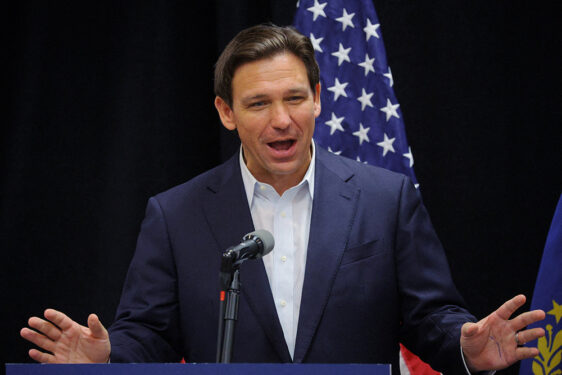
By Jean Gonzalez
ORLANDO, Fla. (OSV News) — As the U.S. bishops gathered for their spring plenary assembly, they voted June 15 to approve a letter intended for Pope Francis that also denounced Florida’s planned execution that day.
“Sadly, on this very day, as this assembly meets, the state of Florida is set to execute a convicted man. We share in your opposition to the death penalty,” the U.S. bishops wrote. The letter included mentions of not just the death penalty, but other items that would be discussed during the bishops’ June 15-16 meeting at the Omni Championsgate Resort located in the southern part of the Diocese of Orlando.
Gov. Ron DeSantis, a Catholic and Republican presidential candidate, signed the death warrant — the fourth of 2023 — for Duane Owen, who has been on Florida’s death row for 37 years.
Owen was convicted of the murders of Karen Slattery, 14, in Delray Beach, and single mother Georgianna Worden, 38, in Boca Raton.
Owen’s June 15 execution by lethal injection was set for 6 p.m., a time when the bishops might break for dinner or evening prayer.
“Capital punishment is indeed a false answer that does not solve the problem for which it is invoked and introduces new elements of destruction,” the bishops stated in their letter. “We pray for the victims of heinous crimes and for the protection of the indelible dignity of every human being.”
The bishops concluded by asking Pope Francis “to bless our assembly and the work that lies before it.”
Upon his death, Owen becomes the 103rd person killed by the state in the name of its residents since 1979.
The condemnation of the death penalty’s use in the letter to the pope follows the example of Florida’s archbishop and six brother bishops.
Since the reinstatement of the death penalty in Florida, the bishops have consistently written to Florida’s governors urging for stays of execution.
At the annual Catholic Days at the Capitol, Florida’s bishops gather together for a personal meeting with the governor, or with his staff, during which they also explain their opposition to the death penalty and urge its disuse.
The Florida Conference of Catholic Bishops, the lobbying arm of the Florida bishops, wrote a May 31 letter to DeSantis, asking him to stay Owen’s execution and commute his sentence to life without parole.
“Intentionally ending his life will do nothing but perpetuate violence in a society steeped in it,” Michael Sheedy, the conference’s executive director, wrote in that letter. “Society must be kept safe from Mr. Owen and those like him, but that can be done effectively without resorting to more violence.”
Since 2018, the Catechism of the Catholic Church has taught the death penalty is morally “inadmissible.” The catechism points out that whether an action is moral or not depends on three things — the action chosen, the intention behind it, and the circumstances around it — all three parts have to be good in order to be morally permissible.
Pope Francis cited St. John Paul II in his 2020 encyclical “Fratelli Tutti,” where his predecessor explained that even when the death penalty is understood as an act of “legitimate defense” on the part of society, the circumstances have changed since modern society now has “the means of effectively suppressing crime by rendering criminals harmless without definitively denying them the chance to reform.”
Owen was convicted of horrific crimes, which include the rape and murder of two women, one a 14-year-old freshman of Pope John Paul II High School (now St. John Paul II Academy) in Boca Raton. Even at the time of his trial, Owen’s competency was in question before a jury convicted him and sent him to death row at 23.
What was not presented at trial was Owen’s own horrific childhood — including such incidents as witnessing at age 11 his father’s own suicide following his mother’s death from cancer and then suffering physical and sexual abuse in an ophanage where he was raped by a 35-year-old child care director.
These horrific experiences psychiatrists stated in court contributed to Owen’s proclivity for violence and his lack of remorse.
Floridians for Alternatives to the Death Penalty planned a vigil on the grounds of Florida State Prison in Starke, gathering across the street from where the death house is located, to pray for Owen and his victims, as well as staffers involved in the execution.
Owen’s execution had a temporary stay as his lawyer’s argued his competency at the time of his crimes in a June 1-2 hearing for which Owen was present.
One psychiatrist described Own as consistently “out of touch with reality and delusional.”
Another said Owen has “no rational appreciation of the connection” between his crimes and his punishment.”
DeSantis has sought to portray himself as tough on crime both in his tenure as governor and in his presidential bid. The Catholic governor has put himself at odds with his state’s Catholic bishops and the church’s magisterium by advocating death penalty expansion.
DeSantis proposed changing state law to allow juries to impose the death penalty without unanimous agreement. State lawmakers later filed — and passed — a bill to lower the threshold to eight out of 12 jurors, which DeSantis signed into law in April.
Out of 27 states that permit capital punishment, only three do not require a unanimous jury. Alabama allows a 10-2 decision, while Missouri and Indiana allow a judge to decide when there is a divided jury, according to the National Center for State Courts.
In an executive order dissolving that temporary stay in the case, DeSantis wrote that psychiatrists who evaluated Owen determined he “has the mental capacity to understand the death penalty and the reasons why it is to be imposed upon him,” rendering the stay “no longer necessary.”
